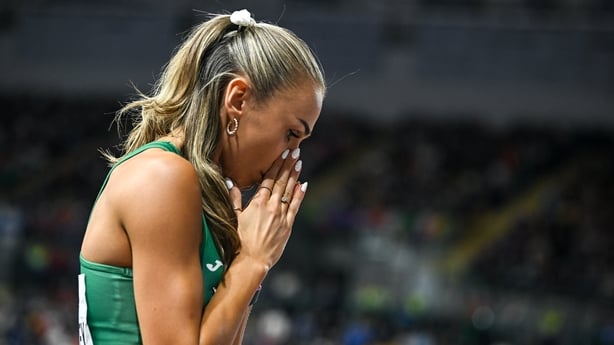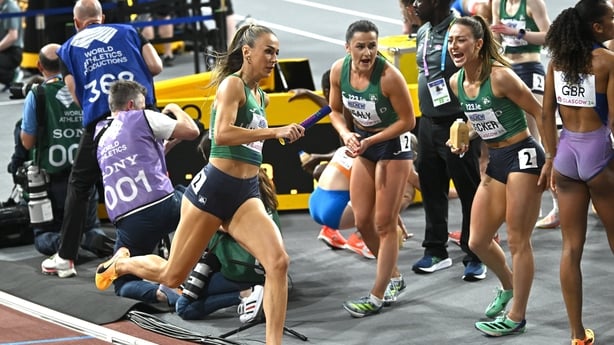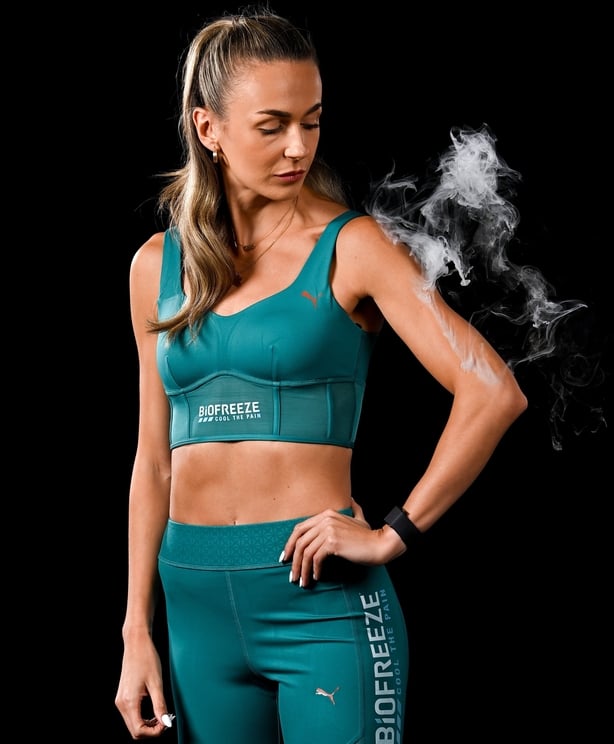It's doubtful any athlete at the recent World Indoor Championships went through the full range of emotions quite like Sharlene Mawdsley.
If she thought the 400m heat was dramatic – a photo finish saw her post the same time as two other athletes with all three advancing to the semi-final – it was a drop in the ocean for what was to follow.
The Newport athlete was ranked sixth coming into the semi-final, but produced a gutsy display to edge past Austria’s Susanne Gogl-Walli and take the third automatic qualifying spot in what was a bustling and physical race.
That ecstasy soon turned to agony when she was disqualified for obstruction, the race officials of the opinion that Mawdsley had cut into the Austrian’s lane too early.
"I did not know the rule that you have to be so far ahead before you cut in," she tells RTÉ Sport. "I just thought you just cut in when you cut in when you are ahead, but that is not the case.
"A lot of people wouldn’t have been disqualified for what I did.
"I remember we were doing an interview and watching the men’s 800m and I was like this is crazy, I didn’t do anything like that. In the end, the decision was made, and I just had to get on with it. At this level, you can’t dwell on it for too long, because the sport moves on.
"Initially the appeal went in I was thinking it's grand, we’re going to counter appeal it. I knew I deserved to be there. Then I found out I really was disqualified and it was different emotions then, I was really upset."

The 25-year-old says she got little sleep that night, playing out the race over and over. Should she have waited for longer like she did in her heat?
There was little time to lick the wounds with the 4x400m relay semi-final, and potentially a final, at stake on the Sunday. Suggestions that she sit out Saturday's relay training were quickly rebuffed. Down, but not out, Mawdsley was hellbent on righting the wrong.
After meeting up with Phil Healy, Sophie Becker and Roisin Harrison, there was an understanding that a final berth was a realistic proposition.
"We knew collectively we could pull something special off once we all pulled together," she said.
And that is what transpired. A national record was lowered by more than a second to 3:28:45, while across both semi-finals, Mawdsley’s split of 50.48 was the fastest posted by any athlete.
While she knew she was in good shape and determined to show it, walking back into the arena after Friday’s debacle was the first hurdle to overcome.
"When I walked onto the track, I was like, 'oh s**t’. I was really nervous. The stadium was full of Irish people and they had my back.
"It was something special being able to go out and I ran with my heart. I knew that it was going to be really tough for us to get into the final, but I knew we really, really wanted to. It was pretty special."

The highly-fancied Netherlands team – including stalwarts such as Lieke Klaver and multiple world record holders Femke Bol – took gold ahead of USA and Great Britain, with the Irish side threatening to break the national record twice in one day as they took fifth.
Significantly, only Klaver (50.26) ran a faster split that Mawdsley (50.47).
After 10 weeks out with a knee injury, Glasgow was confirmation she is moving in the right direction.
"I went into Indoors not really sure what shape I was in. That fitness, you really only get when you’re running. Glasgow really showed that my training really has come on and I’m able to produce back-to-back runs when it really matters.
The championships also illustrated Ireland’s growing standing in relays.
Mawdsley was part of the team that reached the final in last year's World Championships in Budapest, while the 4x400m mixed relay team (which the Tipperary native has also featured on) has made it to the last two World Championship finals.
With Rhasidat Adeleke set to come back into the mix at the World Relays in Bahamas in May - where Paris qualification is the prize – the Tipperary native is chomping at the bit to see what level the Irish team can reach.
"You do get excited and think what we could produce with Rhasidat too. Even going to European Championships (June), we should really be challenging for a medal, it shouldn’t just be that we’re hoping to get into the final," she says.

"Everyone has stepped up to a new level. That’s what is really important and will help us once we have Rhasidat in the mix, to be able to challenge.
"It’s difficult to win a medal when you only have one good girl, but now we have four good girls."
While Mawdsley’s stock has never been higher, she is taking nothing for granted. She hasn’t been confirmed on the Irish team for the World relays, and while her omission is scarcely credible, events from the lead-up to the Tokyo Games have altered her outlook.
Having been part of the Irish 4x400m mixed relay that secured Olympic qualification, she was cut from the team at the expense of Cliodhna Manning, who got the better of her at the nationals.
"Totally heartbroken" was her assessment at the time and reflecting now on that setback, Mawdsley is adamant that it was harsh learning curve.
"You train your whole life to be an Olympian and then it fell through my fingers," she says reflecting on the severe low.
It was hard because I was on the team that qualified so I was big part of why the relay team went [to Tokyo].
"I'm not going in (now) thinking I've qualified. Even though I know that I'm in a good position, there's no way I'm guaranteed to be going.
"I'm really excited once the season gets going because I'm so adamant that it's one race at a time and I'm just running as fast as I can."
Follow the RTÉ Sport WhatsApp channel for the best news, interviews, analysis and features, as well as details of our sports coverage across all RTÉ platforms.


